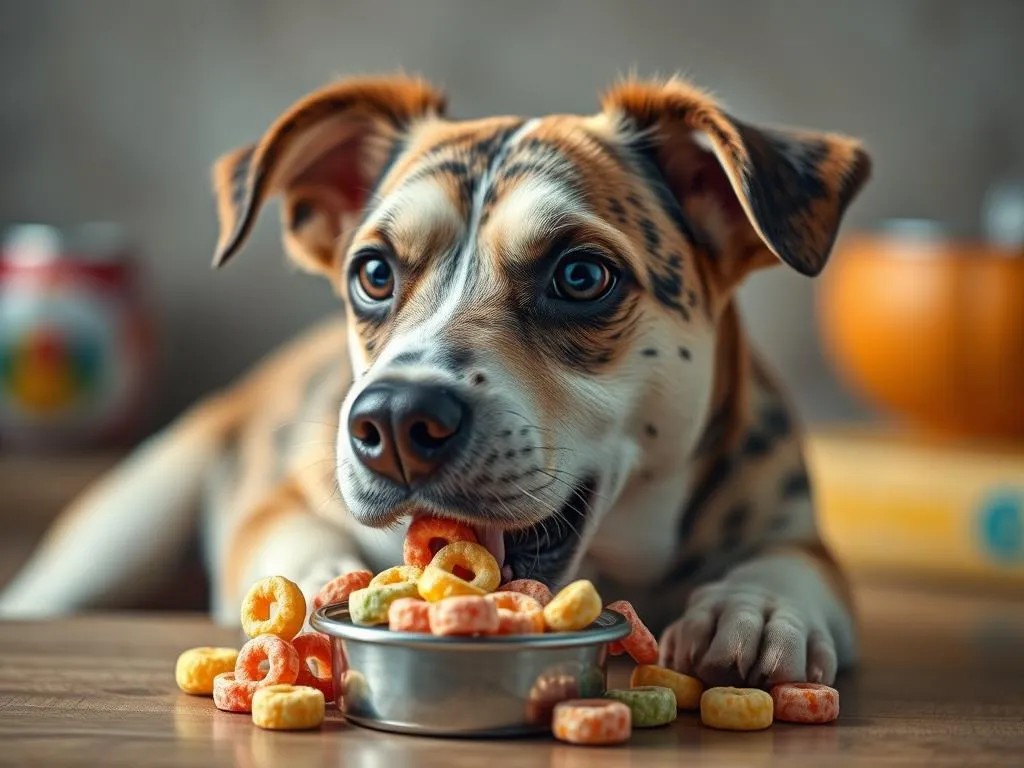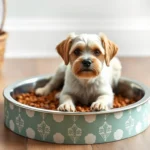
Introduction
Dog nutrition is a vital aspect of responsible pet ownership, as it directly impacts a dog’s health, energy levels, and overall well-being. As pet owners, we often find ourselves questioning what our furry friends can or cannot eat. One common inquiry is: can dogs eat Froot Loops? This popular cereal is a staple in many households, but its suitability for dogs is worth exploring. In this article, we will delve into the nutritional aspects of Froot Loops and assess their appropriateness for canine diets.
Understanding Dog Nutrition
Importance of Balanced Diet for Dogs
A balanced diet is essential for dogs, just as it is for humans. Dogs require a mix of macronutrients to thrive:
- Proteins: Essential for growth, muscle development, and overall health.
- Fats: Provide energy and support cellular function, while also helping to absorb fat-soluble vitamins.
- Carbohydrates: Offer a source of energy and fiber, which is vital for digestive health.
Additionally, vitamins and minerals play crucial roles in a dog’s diet, supporting various bodily functions, including immune health and bone development.
Common Dog Dietary Needs
Dietary needs can vary significantly among dogs, influenced by factors such as breed, age, and size. For example:
- Puppies require a nutrient-rich diet to support their rapid growth and development.
- Adult dogs need a balanced diet to maintain their health and energy levels.
- Senior dogs may require specialized diets to address age-related health issues.
Moreover, dogs with allergies or specific health concerns, such as diabetes or obesity, need tailored diets to manage these conditions effectively.
Overview of Froot Loops
What Are Froot Loops?
Froot Loops is a colorful, sweetened breakfast cereal produced by Kellogg’s. It consists of ring-shaped pieces that come in various bright colors, appealing to children and adults alike. The ingredients typically include:
- Corn flour
- Sugar
- Wheat flour
- Oat flour
- Salt
- Artificial colors and flavors
- Vitamins and minerals
Nutritional Content of Froot Loops
Froot Loops are known for their sweet taste and vibrant colors, but what does their nutritional profile look like? A standard serving (about 30 grams) contains approximately:
- Calories: 110
- Sugars: 12 grams
- Carbohydrates: 24 grams
- Protein: 1 gram
- Fat: 0.5 grams
While Froot Loops do contain some added vitamins and minerals, such as iron and vitamin C, they are predominantly composed of sugars and carbohydrates.
Can Dogs Eat Froot Loops?
Safety of Froot Loops for Dogs
When considering whether dogs can eat Froot Loops, it’s crucial to analyze the potential risks involved. The high sugar content is a primary concern. Dogs do not metabolize sugar in the same way humans do, and excessive sugar intake can lead to health issues such as obesity, dental problems, and diabetes.
Additionally, Froot Loops contain artificial colors and flavors, which may not be suitable for canine consumption. Some dogs may experience gastrointestinal upset after consuming processed foods, leading to issues like vomiting or diarrhea.
In the short term, a small piece of Froot Loops may not cause immediate harm to your dog. However, regular consumption can lead to significant health problems over time.
Expert Opinions
Veterinarians and pet nutritionists often advise against feeding dogs human cereals like Froot Loops. While some dogs may enjoy the taste, the potential health risks outweigh the benefits. Experts emphasize the importance of providing dogs with a diet that meets their nutritional needs without the unnecessary additives found in many human foods.
Portion Control and Moderation
If you decide to let your dog indulge in a small amount of Froot Loops, moderation is key. It’s essential to limit the portion size and monitor your dog for any adverse reactions.
As a general guideline, treats should make up no more than 10% of your dog’s daily caloric intake. For instance, if your dog requires 500 calories daily, then no more than 50 calories should come from treats. This can help prevent obesity and maintain overall health.
Alternatives to Froot Loops
Healthy Treat Options for Dogs
If you’re looking for healthier alternatives to Froot Loops, there are plenty of dog-friendly snacks that are both safe and nutritious. Here are some options:
- Carrots: Low in calories and high in fiber, carrots are great for dental health.
- Blueberries: Packed with antioxidants, blueberries make a sweet, healthy treat.
- Pumpkin: Canned pumpkin (not the spiced pie filling) is excellent for digestive health.
- Peanut Butter: A favorite among dogs, make sure it’s xylitol-free.
- Homemade Dog Treats: Using simple ingredients like oats, pumpkin, and peanut butter can create nutritious snacks.
Nutritional Benefits of Healthy Treats
Healthy treats contribute positively to a dog’s overall diet. They can provide essential vitamins, minerals, and fibers that support digestive health, skin and coat condition, and even dental hygiene. Compared to Froot Loops, which are high in sugar and low in nutritional value, these alternatives offer a much better profile for canine health.
Conclusion
In summary, while dogs can eat Froot Loops in small amounts, it is not advisable due to the high sugar content and artificial ingredients. The risks associated with feeding your dog processed human foods often outweigh the benefits, making it essential for dog owners to prioritize a balanced and nutritious diet.
By focusing on healthy alternatives and understanding the unique dietary needs of your dog, you can help ensure their long-term health and happiness. Proper nutrition is a vital foundation for a dog’s quality of life, and making informed choices is key to fostering a healthy relationship with your furry friend.
FAQs
Can Puppies Eat Froot Loops?
Puppies have specific dietary needs that are crucial for their growth and development. Feeding puppies human food like Froot Loops is not recommended, as it lacks the essential nutrients they require. Instead, opt for high-quality puppy food formulated to meet their needs.
What Should I Do If My Dog Eats Froot Loops?
If your dog accidentally consumes Froot Loops, monitor them for any signs of distress, such as vomiting or diarrhea. If any symptoms arise or if your dog consumes a large quantity, it’s best to consult your veterinarian for advice.
How Often Can I Give My Dog Treats?
Treats should be given in moderation, ideally making up no more than 10% of your dog’s daily caloric intake. Depending on your dog’s size and dietary needs, this could mean a small treat once or twice a day.
By prioritizing your dog’s nutritional needs and being cautious about what you feed them, you can ensure a happy, healthy life for your canine companion.









